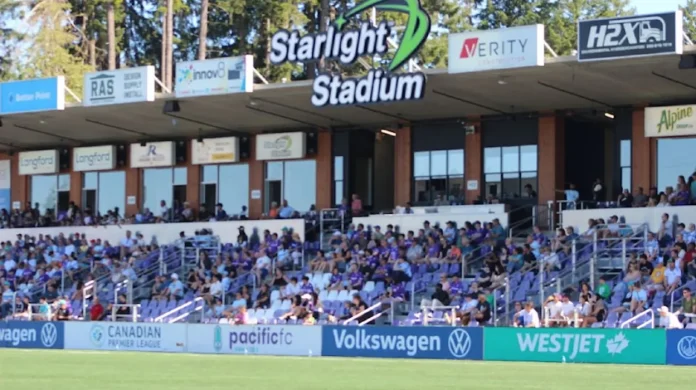Langford, the fast growing city on Vancouver Island, is currently making a splashy bid to become one of 12 official Team Base Camps (TBC) on an international 2026 FIFA World Cup. The tournament is expected to be the biggest in the history of FIFA since it will involve 48 teams across Canada, United States, and Mexico, this means every team needs to have an accredited training camp coupled with good accommodation facilities.
Langford proposed that Starlight Stadium, which is a contemporary sports facility and abides by the majority of infrastructure requirements established by FIFA, will host the world cup games. There is, however, a major setback in the stadium, which is its artificial turf. According to the FIFA rules, any areas of training should use natural grass on which the World Cup matches will be played. This stipulation seems to compel Langford to change its turf playing field to a natural grass field and subsequently restore the turf after the tournament which is estimated to cost the facility between 1 million and 1.5 million dollars.
The economic burden of such a conversion has emerged as the main concern among the Langford city council that has to determine whether to invest in the project or not with unverified outside funding. The ruling has an element of urgency to it because FIFA needs binding commitments and financial guarantees over camp allocations before the deadline of 31 August 2025.
Infrastructure and FIFA’s Demands
Despite the challenge of turf conversion, Starlight Stadium otherwise fits FIFA’s strict technical specifications. Modern coaching offices, media facilities, adequate seating capacity, floodlighting, fitness infrastructure, official vehicle parking facilities and press parking facilities are already available in the stadium. It is also close to quality hotels which meet the accommodation requirements of FIFA which is of great benefit in bringing teams.
The city already has gained a reputation as a sporting ambition with Pacific FC of the Canadian Premier League and a host of national rugby events. To Langford, the World Cup is also the culmination of sports hosting and also the opportunity to sell the destination as being a global sports destination.
However, the time requirement is short, which places pressure. As stressed by FIFA, any delays in the provision of funding or upgrades to its football field will exclude Langford as a hosting site and can lose the hosting to other communities on Vancouver Island or even British Columbia.
Economic and Cultural Benefits of Hosting a Base Camp
Becoming a FIFA Team Base Camp offers a rare platform for international visibility. Daily training sessions are followed by global media, amplifying Langford’s profile far beyond Vancouver Island. Consultant Mark deFrias, who spearheaded Langford’s bid, highlighted the immense value of this exposure, envisioning broadcasts of training sessions featuring icons such as Lionel Messi or Kylian Mbappé.
Such visibility translates into enduring tourism and business opportunities. By branding itself as a city capable of hosting elite athletes and international media, Langford positions itself as a cultural and sporting destination long after the tournament ends.
Comparative Investment Perspectives
Although the turf conversion represents a substantial local expense, it pales compared to the investments being made in official match venues. Vancouver’s BC Place, one of Canada’s primary host stadiums, is undergoing upgrades costing between $483 million and $581 million. From this perspective, Langford’s $1 million pitch looks modest—an opportunity to secure a stake in the World Cup at a fraction of the cost.
Langford’s campaign is further reinforced by Port Alberni’s parallel bid to host a Team Base Camp at Bob Dailey Stadium, which already has a natural grass pitch. The two communities present a united front, seeking to bring multiple international teams to Vancouver Island and share in the economic and cultural dividends.
Funding and Political Challenges
The major obstacle for Langford lies in financing. The city council has petitioned both provincial and federal governments for assistance to offset the turf conversion costs. However, by mid-2025, neither level of government committed new funding. Ottawa noted its previous $115 million contribution toward British Columbia’s broader World Cup preparations, while the provincial government indicated limited capacity for additional spending.
This leaves Langford with a difficult choice: either absorb the costs locally or risk losing its chance to participate in the tournament. While private sponsorships remain an option, the timeline imposed by FIFA complicates securing such deals.
Community and Political Momentum
Despite funding hurdles, community enthusiasm for the bid is strong. Business leaders and residents recognize the potential for economic uplift and international recognition. Local officials frame the investment as a forward-looking strategy, one that positions Langford not just for the World Cup but for future sporting events.
DeFrias describes the cost as “a small ask” relative to the global visibility and legacy benefits at stake. His view reflects a growing consensus that while financially challenging, the opportunity aligns with Langford’s identity as a city striving to emerge on the global sports stage.
Broader Context for Vancouver Island and Canada
Langford’s pursuit is not occurring in isolation. Nearby Port Alberni, with its natural grass facilities, is also vying for base camp status. Rather than competing directly, both cities emphasize complementarity, presenting Vancouver Island as a region capable of hosting multiple teams. This synergy strengthens their collective bargaining power and enhances the likelihood of attracting international squads.
Canada’s Expanding Role in Global Football
Since Vancouver will host some of the official matches, the entire British Columbian region will enjoy a great deal of international attention. Langford’s bid meets the national policy of using the tournament as a means of promoting Canadian reputation in the world sports arena and stimulating the economies in the region.
Having base camps is another avenue where the mid-sized communities will be contributing to provide meaningful contributions to the World Cup where the benefits will not be limited within the prime cities hosting the matches.
Future Prospects and Questions Ahead
The one million dollar pitch by Langford is a summary of the juggling act that the small/mid-sized cities must make when tackling mega sporting events. The benefits of international publicity, development of tourism and local pride should be outstretched to the facts of financial risk, little government support and strict time schedules posed by FIFA.
In the event Langford makes it work, the investment may become a precedent-setting piece of work when used by other communities who might be interested in creative ways of entering into the global sports economy. An effective labeling of Langford as a base camp would not only elevate the city during the World Cup, but it will also make future tournaments and international competitions, even more attractive to host in Langford.
Langford claims to put themselves into the real world in terms of their bid; until now, this has not been made clear. This aspect will depend on whether the city will be able to access the required financial resources and within the stipulated times of FIFA. However, despite these doubts, there still remains the enormous aspiration of how sports can become a transformational instrument to cities interested in expanding to the rest of the world.
The future of the world-class athletes to train on new turf in Langford remains to be seen. What is evident however, is that the readiness of the city to spend and invest in a daring idea is a sign that the contribution of smaller communities towards the overall sporting story of Canada in the world is growing.













